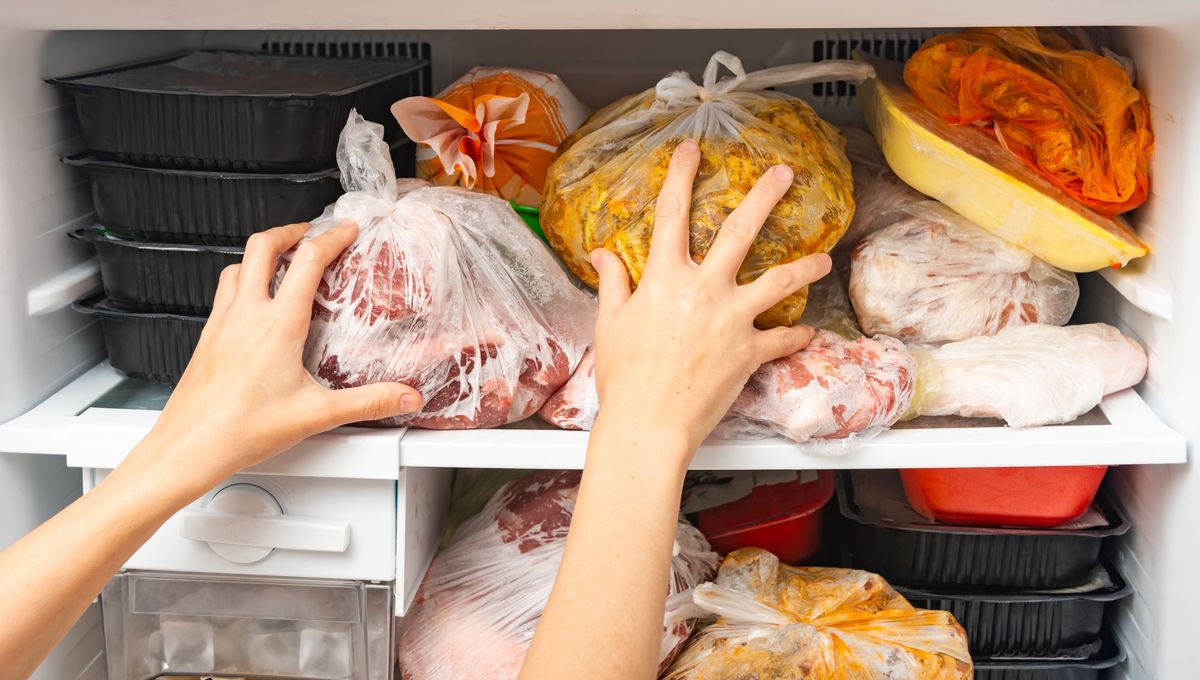
If you own a freezer, it’s likely you’ve at some point had to contend with freezer burn. That package of meat or bag of leftovers you tucked away safely for another day has come out looking a funny color and covered in ice. Is it still safe to eat, and how can you stop this from happening again? Don’t worry – we’re here for all your frozen food-related queries, and this one’s no different.
What is freezer burn?
This term is a bit of a misnomer – what we call “freezer burn” is more the result of dehydration.
When you freeze food – any type of food – the water within it becomes crystals of ice. Over time, the ice migrates out towards the surface of the food and, if it can escape, it heads towards the coldest part of the environment. That’s generally the walls of the freezer, and unless you have a self-defrosting model, you’re going to be spending time removing all that buildup of ice yourself.
If a food is not packaged tightly, the ice is more likely to escape, dehydrating the food and causing freezer burn. It also becomes more likely the longer a food is left to languish in the bottom of the freezer, or if your freezer is not set to a consistent temperature of 0°C (-18°F) or below.
Another part of the picture is oxygen. If moisture can escape, oxygen can probably get in, which can react with the food and affect its color and taste – this is why you might find that red meat has gone a sad gray color, for example.
Is freezer-burned food safe to eat?
Generally speaking, freezer burn is considered a quality issue rather than a safety issue.
“Freezer burn does not make food unsafe, merely dry in spots,” says the US Food Safety and Inspection Service (FSIS).
That said, it’s not exactly appetizing. You may find that the flavor and texture of the food is compromised and is no longer to your liking. “Cut freezer-burned portions away either before or after cooking the food. Heavily freezer-burned foods may have to be discarded for quality reasons,” the FSIS recommends.
The agency lists maximum recommended freezer storage times to preserve optimal quality for a range of foods – uncooked steaks could still be fine after a year, while cooked poultry is best eaten within four months. Again, these refer to quality, not safety – but if something has been languishing at the bottom of your freezer for longer than you can remember, if it smells weird, or if you literally can’t tell what food it even is anymore, it’s probably best just to throw it out.
How can you prevent freezer burn?
Freezing is a great way of preserving food, but in order to get the best out of it there are a few simple tips you should follow.
The National Center for Home Food Preservation at the University of Georgia has a detailed guide to freezing all types of foods, but there’s one point that comes up time and again: packaging. As we’ve seen, freezer burn happens when moisture can escape and air can get in, so you want to make sure the packaging you’re using will keep a tight seal.
But buyer beware – the packet that you purchased the food in may not always be best for freezing it. For example, when freezing meat products, grocery store packaging may not be enough: “Store-bought meats need to be over-wrapped, since their clear packaging is not moisture-vapor resistant.”
Your freezing methods may also need to be adapted for different foods. For example, you can freeze seafood or fish fillets by first glazing them in ice water, creating a protective coating that stops air from getting in.
Freezing food as quickly as possible also helps fewer ice crystals to form in the first place, reducing the chance of freezer burn down the line. If you need to freeze large quantities of food in one go, consider temporarily reducing the temperature of your freezer.
The bottom line
Freezer burn doesn’t affect the safety of the food, but it does affect how pleasant it is to eat, so it’s best avoided if you can. The main takeaways are to avoid moisture getting out and air getting in, but it’s also important to remember that freezer burn is more likely the longer something is stored. Although it can be tempting to stock up, try to only freeze what you’re likely to use within a few months, and check back regularly so nothing gets left in bottom-drawer limbo.
Plus eating those leftovers that you nearly forgot about means there’s more room for ice cream, so it’s a win-win.
All “explainer” articles are confirmed by fact checkers to be correct at time of publishing. Text, images, and links may be edited, removed, or added to at a later date to keep information current.
Source Link: Why Your Frozen Food Is Getting “Freezer Burn”, And What You Can Do About It